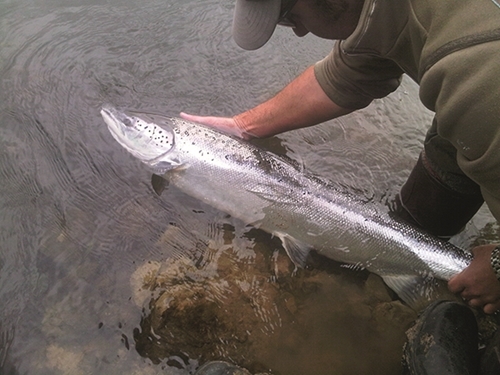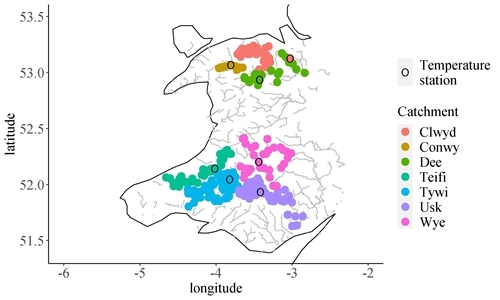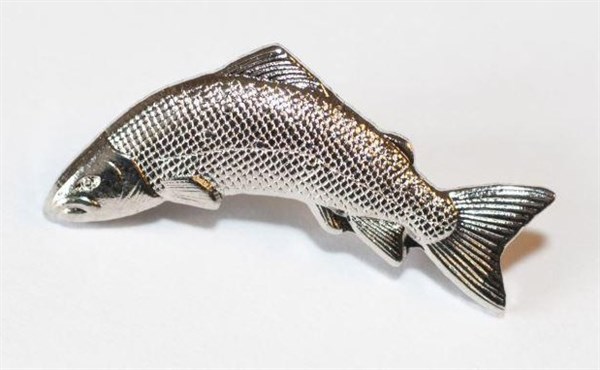
Numbers of young salmon in Wales are lower following warmer winters and wetter springs, according to a new study commissioned by Natural Resources Wales (NRW). These findings might explain the widespread juvenile salmon crash observed after the then record warm and wet winter and spring of 2015-16.
While salmon stocks have declined across southern European rivers for some time, a widespread crash in juvenile salmon numbers in 2016 saw a sharpened focus into what drives their numbers and so might have caused the crash. Low juvenile numbers, as seen in 2016, can have a knock-on effect on adult returns in future years.
Concerned about the impact, NRW commissioned WRc plc and the Game & Wildlife Conservation Trust (GWCT) to analyse data collected on seven Welsh rivers (the Clwyd, Conwy, Dee, Teifi, Tywi, Usk and Wye) between 2001 and 2017 with a particular focus on 2016.
Focusing on ‘young-of-the-year’ salmon and trout (those from eggs hatched that spring), the study, due to be published in Freshwater Biology, found that juvenile salmon – and to a lesser extent trout – numbers were lower following warm winters and wet springs and that the 2016 salmon crash coincided with extreme winter and spring weather conditions.
Warm winters can present a real challenge to salmon and trout, with increased temperatures negatively impacting both spawning behaviour and egg survival. The winter of 2015-16 was notable for its exceptionally high temperatures around the time of salmon spawning, leading to speculation that those high temperatures interfered with normal salmon spawning behaviour.
Many of the rivers studied also suffered flooding in the spring of 2016, potentially causing ‘egg washout’ whereby eggs are washed out of the spawning nests, known as redds, into unsuitable habitat where they are likely to die. These washouts are more severe in steep rivers susceptible to flooding, as is common across Wales.

Dr Stephen Gregory, who undertook much of this research for the GWCT, said: “These findings suggest that already weakened salmon populations might be sensitive to extreme weather events that are forecast to become more frequent and intense under future climate change scenarios”.
He also highlighted how projects like SAMARCH can help to move towards including environmental variables, such as temperature and flow, into stock assessment models (SAMs) used to manage salmon and trout stocks in England and Wales and beyond. He said “capturing the effects of extreme weather events in SAMs will become more important if these events are becoming more frequent”.
Peter Gough, NRW’s Principal Fisheries Advisor added: “We know that salmon populations have been in decline all over Europe, and this is also the case in Wales. A key part of conserving some of our most at-risk biodiversity is to build our understanding of the pressures and issues that our wild species are facing – including the impact of climate change on their numbers.
“By commissioning work such as this we can make informed decisions to help reverse their decline and protect these iconic species for future generations.”

Get your GWCT Fisheries Badge for £9.99
£5 from the sale of each badge goes directly to our fisheries research centre in Dorset
You can help us understand what's driving the decline in Atlantic Salmon numbers by buying one of our salmon pewter pin badges. The badge measures approx. 3cm.
View Badge >
or
Buy Now - £9.99 >
100% Secure. All Credit & Debit cards, PayPal, Apple Pay and Google Pay accepted.

Notes to editors
The Game & Wildlife Conservation Trust – providing research-led conservation for a thriving countryside. The GWCT is an independent wildlife conservation charity which has carried out scientific research into Britain’s game and wildlife since the 1930s. We advise farmers and landowners on improving wildlife habitats. We employ more than 60 post-doctoral scientists and other research staff with expertise in areas such as birds, insects, mammals, farming, fish and statistics. We undertake our own research as well as projects funded by contract and grant-aid from Government and private bodies. The Trust also has a dedicated professional advisory service to make sure that the results of its research are easily available to farmers, landowners, gamekeepers, and others delivering practical conservation.
For information, contact:
Eleanor Williams
Telephone: 07592 025476
Email: ewilliams@gwct.org.uk